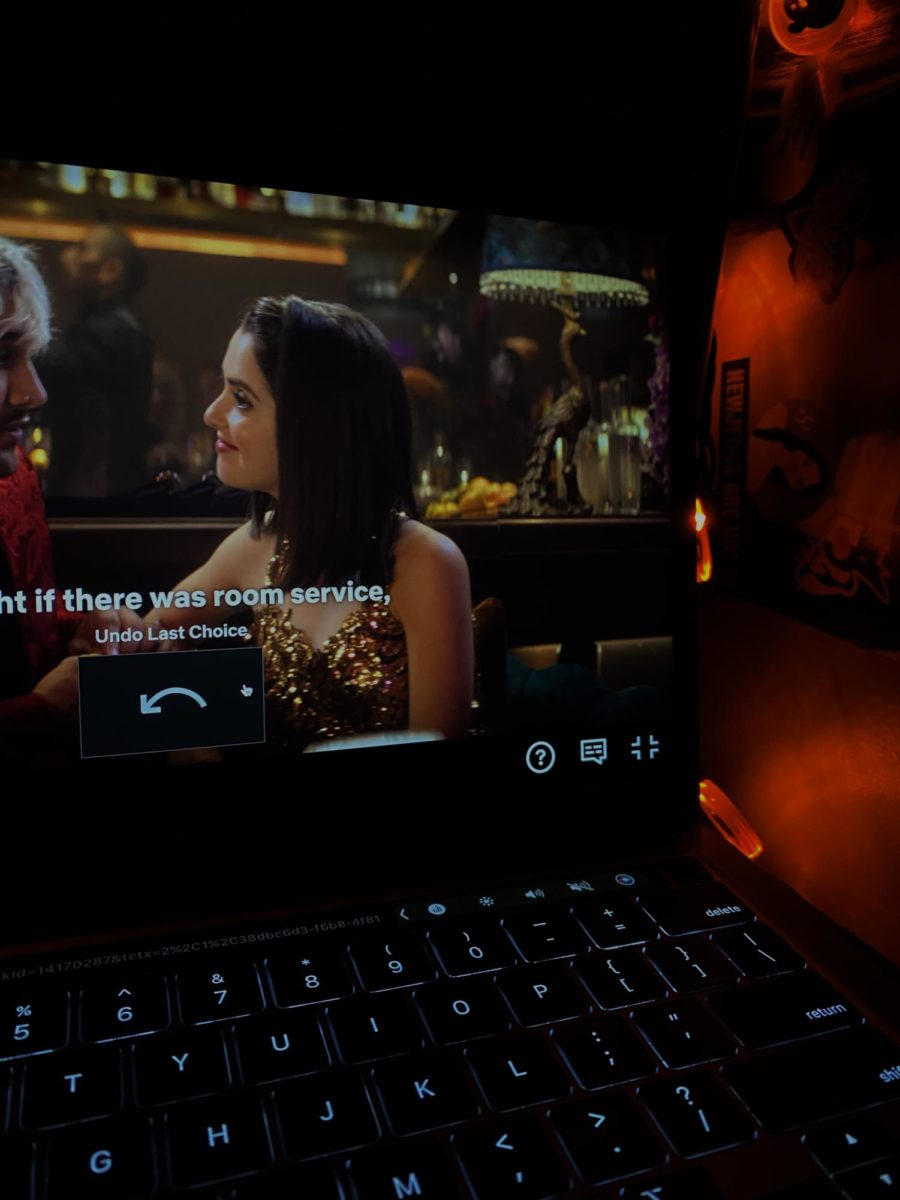Though it’s still in development, the Netflix interactive film model may already be overdue to make its own interactive decision: whether or not it will emphasize the writer’s efforts. The studio’s newest interactive project, “Choose Love,” and its criticisms shed a confusingly tainted light on the modernization of story-telling amid the Writers Guild of America (WGA) strike.
For the film’s six basic alternate endings–and countless alternate scenes along the way–four years of work were needed, with production and filming only starting in the last year. The writer, Josann McGibbon, is a member of the WGA.
Streaming was a driving force of the WGA and Screen Actors Guild-American Federation of Television and Radio Artists (SAG-AFTRA) union strikes that started on May 2, and July 14, respectively. Among many other factors, the overwhelming lack of long-term payment–due to shorter seasons for original shows–and lack of continuity in streaming television made the earnings of writers, actors and other creative officials even more unstable than they already were.
After talks of regulations and fair pay were ignored by the Alliance of Motion Pictures and Television Producers (AMPTP), which represents hundreds of production companies, the WGA refused to renew its contract with the alliance, and its workers went on strike. While the SAG-AFTRA strike is still active, the WGA ceased activities after an agreement was finally reached in late September.
A parameter of the strike was the inability of union writers and producers to advertise or release films unless they were personal projects. This made the mid-strike release of “Choose Love” stand out as McGibbon’s personal 4-year passion project.
The film follows Cami, a recording engineer whose only consistent personality traits are her playful nature and her dream to be an independent singer and producer. Most other aspects of her character are dictated by the viewer who constantly makes life-changing choices for her.
For junior Helaina Moran, the appeal to build a character’s decisions off the audience is materialistic. “I feel like it feeds into the same type of consumer culture that makes production companies feel pressured to release mediocre show after mediocre show quickly enough to temporarily satisfy viewers,” Moran expressed.
The impact of consumer culture on streaming releases is a major reason for the industry’s overwhelming shift to a capitalist model, where pleasing the shareholders is valued above artistic integrity and, unsurprisingly, the appreciation of their workers. After all, what would make networks forget the role of writers more than giving consumers the chance to “write” their own story?
Co-assistant director of Pleasant Valley Theater Erin Klage, who also teaches Economics and Advanced Placement U.S. History, believes the entire scheme behind the interactive film is purely market-based. “Especially now that competition has saturated the market, how do you set yourself apart from different streaming services? So, it’s a way that Netflix is trying to remain relevant, but at the same time you’re getting more of a formula-based [project] rather than the creativity of writing,” Klage stated. Of course, competition and the overwhelming consumer shift to streaming are main reasons why studios took so long to reach a deal with the WGA.
Furthermore, interactive narratives seem to detach the audience from the fundamental story. Every decision has the possibility to be revisited, leaving the audience with a plaguing lack of decisiveness. Because Cami’s development is so reliant on the decisions of the viewer, to many, the story loses an impactful narrative. Some claim the ultimate framework of the film loses the impact writing has on audiences and their relationships with characters, therefore leading to unsatisfactory endings.
Theoretically, the movie’s criticisms could emphasize a more writer-centered solution. To write an interactive film, the writer must incorporate alternate possibilities and scenes for every option chosen by the viewer. Since full commitment to the cause could lead to an obscene amount of alternative stories, many of these decisions only cause temporary alternative scenes. However, it is the complicated decisions with completely story-altering consequences where the hard work of writers like McGibbon should pay off artistically.
But it’s unclear whether artistry is even on the table for Netflix when it comes to the production of its interactive content. “It’s definitely more of a streamlined perspective of viewers, not necessarily a writing focus, which is one of the main reasons why they went on strike,” Klage said.
Other interactive Netflix films, such as “Black Mirror: Bandersnatch,” also failed to grasp the effect of an impactful narrative. “Bandersnatch,” and its pioneering of the genre was admired and revered as a concept with lots of potential; however, it was still essentially considered an “artificial construction” in which the audience never is truly “emotionally invested,” according to a review from The New York Times.
The timing of the release of “Choose Love” comes right at the peak of the writer’s strike. While the WGA agreement, which has technically not yet been voted on by the union members, includes a number of protections for writers, the ways in which companies will interpret the role of writers in interactive films is still unpredictable; the model is still mainly unexplored and the studios still have shareholders to worry about. It may be time for writers and viewers to turn the table and this time give Netflix the pressuring decision to choose whether viewer-centered experiences like this will offer more genuine work for writers or further bury them under a mound of materialistic consumption pieces.
This story was originally published on Spartan Shield on October 3, 2023.




































